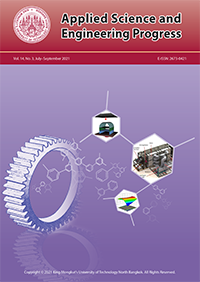Energy, Economic and Environmental (3E) Analysis for Sustainable Development: A Case Study of a 9.9 MW Biomass Power Plant in Thailand
Main Article Content
Abstract
In Thailand, the use of biomass for electricity generation has been implemented with incineration technology for many years. However, recent reports indicate that electricity demand is still high and biomass power plant is one of the key factors for electricity management. The major purpose of this research paper is to analyze the energy, economic and environmental features of biomass power plant for the national sustainable development strategy. An existing 9.9 MW biomass power plant located in Suphanburi is selected as the case study to assess thermal combustion for electricity generation. The in-house operations of biomass-based power plant and the process flow of energy in terms of electricity generation using agricultural wastes and forestry residues are provided. Different expenses like capital cost, processing cost, and transportation cost and the major revenue from the sale of electricity are taken into consideration. Five environmental factors (air, sound, water, ash, and transportation) of biomass power plant for sustainability are investigated. Findings from this research project indicate that incineration is a suitable technology for biomass-based electricity generation with considerable profit for all stakeholders.
Article Details
References
[2] S. Y. Yokoyama, T. Ogi, and A. Nalampoon, “Biomass energy potential in Thailand,” Biomass and Bioenergy, vol. 18, no. 5, pp. 405–410, 2000.
[3] S. Phuangkaew, “Development of risk assessment methods for accident and technology management in power plants of Thailand,” Ph.D. dissertation, King Mongkut's University of Technology North Bangkok, Bangkok, 2019 (in Thai).
[4] S. Prasertsan and B. Sajjakulnukit, “Biomass and biogas energy in Thailand: Potential, opportunity and barriers,” Renewable Energy, vol. 31, no. 5, pp. 599–610, 2006.
[5] S. T. Tan, W. S. Ho, H. Hashim, C. T. Lee, M. R. Taib, and C. S. Ho, “Energy, economic and environmental (3E) analysis of waste-toenergy (WTE) strategies for municipal solid waste (MSW) management in Malaysia,” Energy Conversion and Management, vol. 102, pp. 111–120, 2015.
[6] F. C. Luz, M. H. Rocha, E. E. S. Lora, O. J. Venturini, R. V. Andrade, M. M. V. Leme, and O. A. Olmo, “Techno-economic analysis of municipal solid waste gasification for electricity generation in Brazil,” Energy Conversion and Management, vol. 103, pp. 321–337, Jul. 2015.
[7] F. L. Sivrioglub, “A maturity model for enterprise risk management,” International Journal of Production Economics, vol. 173, pp. 66–79, 2016.
[8] Ministry of Energy of Thailand, “Energy infrastructure,” 2020. [Online]. Available: https:// data.energy.go.th/output/infrastructure
[9] A. K. James, R. W. Thring, S. Helle, and H. S. Ghuman, “Ash management review-applications of biomass bottom ash,” Energies, vol. 5, no. 10, pp. 3856–3873, 2012.
[10] Energy Regulatory Commission of Thailand, “Energy Policy and Planning Office Annual Report 2015,” Bangkok, Thailand, 2015.
[11] The Pollution Control Department, “The Pollution Control Department,” 2020. [Online]. Available: http://actionforclimate.deqp.go.th /?p=6569& lang=en
[12] B.Grimm, “B.Grimm Power Public Company Limited Empowering The World Compassionately Sustainability Report 2017,” B.Grimm, Bangkok, Thailand, 2017.
[13] M. Jongprasithporn, A. Martsri, S. Phuangkaew, W. Yeamma, and N. Yodpijit, “Environmental analysis of biomass power plants for sustainability in Thailand,” in IEEE International Conference on Industrial Engineering and Engineering Management, 2017, pp. 1222–1226.
[14] J. Cardoso, V. Silva, and D. Eusébio, “Technoeconomic analysis of a biomass gasification power plant dealing with forestry residues blends for electricity production in Portugal,” Journal of Cleaner Production, vol. 212, no. 2019, pp. 741–753, 2019.
[15] Department of Alternative Energy Development and Efficiency, Ministry of Energy of Thailand “Biomass,” 2020. [Online]. Available: http:// biomass.dede.go.th/biomass_web/index.html


